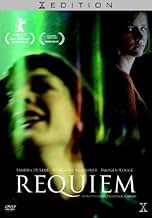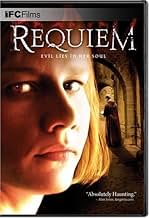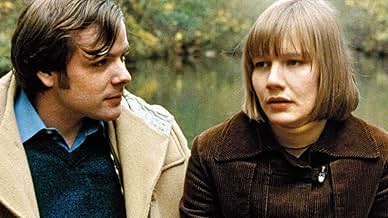IMDb RATING
6.8/10
6.7K
YOUR RATING
A young woman with epilepsy suffers a breakdown during her first year at university, then decides to seek help from a priest in battling the troubles associated with her strict upbringing.A young woman with epilepsy suffers a breakdown during her first year at university, then decides to seek help from a priest in battling the troubles associated with her strict upbringing.A young woman with epilepsy suffers a breakdown during her first year at university, then decides to seek help from a priest in battling the troubles associated with her strict upbringing.
- Awards
- 16 wins & 19 nominations total
- Director
- Writer
- All cast & crew
- Production, box office & more at IMDbPro
Featured reviews
Top notch performance by Sandra Huller, who thoroughly deserved the Silver Bear for the best actress in this film at the Berlin Film Festival. A very good film on epilepsy and mental illness, not possession by the evil spirits. Ms Huller has been consistently performing well in the films,such as "In the Aisles" and "Toni Erdmann."
Requiem (2006)
When a positive, well-meaning, troubled young woman meets an ungodly end at the hands of religious zealots, it matters that it is based on fact. So when you see what is going on here to this girl, leaving for college and struggling with some kind of mental disorder, you not only feel for the character. You are astonished about a culture that still has room for this.
The portrayal of mental illness has transformed enormously in the history of movies partly because psychology has changed, too, from Freud and Jung to now. Even looking at the last few minutes of "Psycho" (which everyone conveniently forgets), you see that arch confidence and inaccuracy of mid-century psychology. And now, in 2011, we know how to treat epilepsy (the purported disorder of the main character) and even schizophrenia (likely an additional problem judging by the symptoms) with some level of control.
But this movie is set between the two, around 1971, and so with hindsight we are shocked and frustrated by the people around our main character showing either a "get over it" attitude of a more deadly "god will intervene" kind of attitude. Neither was a good thing.
And yet this woman, played with unusual conviction and brilliant by Sandra Huller, is all about trying to survive. Because of her upbringing she interprets some events as God rejecting her (she can't reach her rosary beads during one epileptic fit), and of course this leads to priests, and to the priests thinking they know how to possibly cure the poor girl. Eventually real life exorcisms are performed, and in a weird synchronicity, a real-world version of the 1973 American film, "The Exorcist."
This one is German, and instead of making everything strange, it makes everything universal. We sometimes think of religious extremism as an American trait, but in fact it is everywhere. This version gives it a Roman Catholic overtone and yet grounds in the the real world, where priests are rather ordinary folk. not mythic brooding types (though the younger priest here is, vaguely, a German Damien). The original "The Exorcist" it turns out was based on a German Lutheran (not Catholic) boy, yet another small echo of one movie to the other.
The comparisons can go too far, for sure. This is a modern movie in what is one thread of contemporary European filmmaking--understated, realist, tautly filmed, issue based movies, many of them from Denmark or Germany. It's a great complement to what is being made here (in the U.S.), with a different flair for dialog and sometimes a more elaborate production sense. This is not small budget but it is straight ahead and almost bare bones in its approach, thoughtfully made and edited. And pertinent now in the sense that fanaticism in any form is to be questioned before it's too late.
When a positive, well-meaning, troubled young woman meets an ungodly end at the hands of religious zealots, it matters that it is based on fact. So when you see what is going on here to this girl, leaving for college and struggling with some kind of mental disorder, you not only feel for the character. You are astonished about a culture that still has room for this.
The portrayal of mental illness has transformed enormously in the history of movies partly because psychology has changed, too, from Freud and Jung to now. Even looking at the last few minutes of "Psycho" (which everyone conveniently forgets), you see that arch confidence and inaccuracy of mid-century psychology. And now, in 2011, we know how to treat epilepsy (the purported disorder of the main character) and even schizophrenia (likely an additional problem judging by the symptoms) with some level of control.
But this movie is set between the two, around 1971, and so with hindsight we are shocked and frustrated by the people around our main character showing either a "get over it" attitude of a more deadly "god will intervene" kind of attitude. Neither was a good thing.
And yet this woman, played with unusual conviction and brilliant by Sandra Huller, is all about trying to survive. Because of her upbringing she interprets some events as God rejecting her (she can't reach her rosary beads during one epileptic fit), and of course this leads to priests, and to the priests thinking they know how to possibly cure the poor girl. Eventually real life exorcisms are performed, and in a weird synchronicity, a real-world version of the 1973 American film, "The Exorcist."
This one is German, and instead of making everything strange, it makes everything universal. We sometimes think of religious extremism as an American trait, but in fact it is everywhere. This version gives it a Roman Catholic overtone and yet grounds in the the real world, where priests are rather ordinary folk. not mythic brooding types (though the younger priest here is, vaguely, a German Damien). The original "The Exorcist" it turns out was based on a German Lutheran (not Catholic) boy, yet another small echo of one movie to the other.
The comparisons can go too far, for sure. This is a modern movie in what is one thread of contemporary European filmmaking--understated, realist, tautly filmed, issue based movies, many of them from Denmark or Germany. It's a great complement to what is being made here (in the U.S.), with a different flair for dialog and sometimes a more elaborate production sense. This is not small budget but it is straight ahead and almost bare bones in its approach, thoughtfully made and edited. And pertinent now in the sense that fanaticism in any form is to be questioned before it's too late.
Just saw the US premiere of the film at the Seattle International Film Festival. I have seen the American version of this story, but this is a far different film with a different goal.
While the US version concentrated on the more sensational parts of the story and the aftermath, this movie is much more interested in the drama of the situation and avoids the 'creeky door' effect of the US version. The filmmaker is very dispassionate about attempting to convince you one way or the other if it was a possession or a woman's psychological breakdown and I find that most appealing. (The US version also tried to ride the fence in a sense, but it was more obvious which "side" it picked as there were many horror movie moments, not present in this version.) The acting was universally GREAT and all actors were so very convincing in their roles. It will be interesting to see how American audiences that venture out to see this version accept it (It will NOT be the hit that "Emily Rose" was here as this will be considered an art film in America and I doubt will be widely released.) Look for it in the US and check it out!
While the US version concentrated on the more sensational parts of the story and the aftermath, this movie is much more interested in the drama of the situation and avoids the 'creeky door' effect of the US version. The filmmaker is very dispassionate about attempting to convince you one way or the other if it was a possession or a woman's psychological breakdown and I find that most appealing. (The US version also tried to ride the fence in a sense, but it was more obvious which "side" it picked as there were many horror movie moments, not present in this version.) The acting was universally GREAT and all actors were so very convincing in their roles. It will be interesting to see how American audiences that venture out to see this version accept it (It will NOT be the hit that "Emily Rose" was here as this will be considered an art film in America and I doubt will be widely released.) Look for it in the US and check it out!
In the 70's, in the countryside of Germany, the epileptic Michaela Klingler (Sandra Hüller) joins the pedagogy course in the university against the will of her pious mother Marianne {Imogen Kogge). However her father Karl Klingler (Burghart Klaußner) rents a room in a sorority house and the religious Michaela travels to Tübingen. Along the semester, Michaela befriends her former high school mate Hanna Imhof (Anna Blomeier) that forces her to seek medical assistance and falls in love for the student of chemistry Stefan Weiser (Nicholas Reinke). When Michaela has a crisis, she stops using the necessary drugs and believes she is possessed by demons, and her health gets worse. She decides to seek out the priest Martin Borchert (Jens Harzer) that believes in exorcism instead of the progressive parochial priest Gerhard Landauer (Walter Schmidinger) that tries to convince her to go to a psychologist. When she has an intense breakdown, her mother together with priest Borchert decide to exorcise her with tragic consequences.
"Requiem" is an impressive dramatic movie about the fight between religion and science. In accordance with the introduction of this film, the story would be based on a true event. The acting is wonderful, giving credibility to the plot, and the dialogs and characters present a great discussion between the dogmatic religion and reason. Michaela is very well developed and it is easy to understand her confused state of mind since she had a repressed and overprotected upbringing. Hannah represents the logic and the reason; Marianne and priest Borchert represent the backward and dogmatic side of the church; Karl and priest Landauer represent the in-between these two sides. "Requiem" is not a pleasant or entertaining feature but highly recommended for fans of a powerful drama with magnificent acting and the excellent German cinema. My vote is seven.
Title (Brazil): "Requiem"
"Requiem" is an impressive dramatic movie about the fight between religion and science. In accordance with the introduction of this film, the story would be based on a true event. The acting is wonderful, giving credibility to the plot, and the dialogs and characters present a great discussion between the dogmatic religion and reason. Michaela is very well developed and it is easy to understand her confused state of mind since she had a repressed and overprotected upbringing. Hannah represents the logic and the reason; Marianne and priest Borchert represent the backward and dogmatic side of the church; Karl and priest Landauer represent the in-between these two sides. "Requiem" is not a pleasant or entertaining feature but highly recommended for fans of a powerful drama with magnificent acting and the excellent German cinema. My vote is seven.
Title (Brazil): "Requiem"
Requiem works for many reasons--an intelligent script, understated direction, a somewhat verite camera style--but most of all it works because of Sandra Huller. For all of Michaela's exceptionalism, at no point could I doubt this character. As a recovering Catholic myself, I'm sensitive to the role religion, especially Catholicism, plays in people's lives; and Huller, in my opinion, creates the real thing: implicit faith that needs neither to advertise nor to apologize. Michaela's faith isn't about doctrine or rules but the meaning of life--more specifically, about living the meaning of one's own life, including its less attractive implications. Her faith makes her vulnerable to the devil (or, if you prefer, to her imagination that the devil is messing with her), but her faith also endows her growing suffering (and her eventual death, which she clearly foresees; note her reference to "martyrdom" in one of the last scenes) with an abundance of the same meaning that has sustained her life. She is peaceful at the end ("I must walk my path to the end.") That may be hard for a non-religious person to understand, but to someone raised on stories of the great saints, as Michaela was, it makes perfect sense. It is even something to be grateful for.
Requiem pulls off a bit of cinematic legerdemain in making Michaela a relatively open, non-fanatical, non-prudish woman in spite of the depth of her faith. Her real-life original, Anneliese Michel, wasn't much like that. She was a very conservative Catholic deeply opposed to the liberalization then occurring in the Catholic church after the Vatican Council. Her death and the subsequent trial of her parents and the exorcists forced a kind of confrontation, at least in Germany, between Catholic traditionalism, which has an entirely literal belief in spiritual realities and regards demonic possession and exorcism as established facts, and ecclesiastical modernism, which is embarrassed by such medieval notions and therefore preferred to take the position that Michel was "merely" mentally disturbed. (And if she were, did she suffer any the less? Was her faith any less meaningful to her?) Traditionalists regard Michel, her parents, and the exorcists as martyrs to a modernist church disloyal to its Christian past, and Michel's grave is today a pilgrimage site primarily for conservative Catholics. You'd never guess any of this from Requiem's very sympathetic treatment of her story.
Requiem pulls off a bit of cinematic legerdemain in making Michaela a relatively open, non-fanatical, non-prudish woman in spite of the depth of her faith. Her real-life original, Anneliese Michel, wasn't much like that. She was a very conservative Catholic deeply opposed to the liberalization then occurring in the Catholic church after the Vatican Council. Her death and the subsequent trial of her parents and the exorcists forced a kind of confrontation, at least in Germany, between Catholic traditionalism, which has an entirely literal belief in spiritual realities and regards demonic possession and exorcism as established facts, and ecclesiastical modernism, which is embarrassed by such medieval notions and therefore preferred to take the position that Michel was "merely" mentally disturbed. (And if she were, did she suffer any the less? Was her faith any less meaningful to her?) Traditionalists regard Michel, her parents, and the exorcists as martyrs to a modernist church disloyal to its Christian past, and Michel's grave is today a pilgrimage site primarily for conservative Catholics. You'd never guess any of this from Requiem's very sympathetic treatment of her story.
Did you know
- TriviaSandra Hüller's feature film debut.
- ConnectionsFeatured in The Making of 'Requiem' (2006)
- SoundtracksDown 'n' Out
Performed by Light of Darkness
Written by J. Latimer, B. Grant, M. Reoch and M. Bebert
Courtesy of MOP-Musikverlag Hans Sikorski KG
With kind permission of Second Battle Records
- How long is Requiem?Powered by Alexa
Details
Box office
- Gross US & Canada
- $9,600
- Opening weekend US & Canada
- $3,309
- Oct 22, 2006
- Gross worldwide
- $262,460
- Runtime
- 1h 33m(93 min)
- Color
- Sound mix
- Aspect ratio
- 2.35 : 1
Contribute to this page
Suggest an edit or add missing content




























